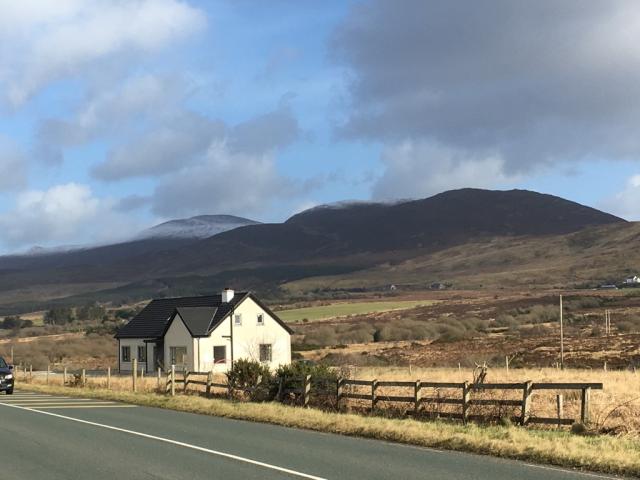An autonomous approach to rural development in Ireland
by Brian Flanagan, Irland*
Parts of my County Donegal are 350 km from Dublin. If one drives through Northern Ireland one can shorten the journey to 200 km. The average wage here is less than 50% of what it is in County Dublin. In the last census Ireland’s city populations had substantially increased while ours and two others had decreased. The cities are expected to increase much more in coming years while rural farming and rural populations are set to decrease. This has been allowed to happen by successive governments. Many believe that the development is in fact intended by EU and UN policy makers. It is both unjust and intolerable. Every week-end the roads of Ireland are jammed with families travelling back to where they were reared and educated. The trend must be reversed. The cities must decrease and the countryside increase. But how?
To stop the haemorrhaging of our best and brightest from rural Ireland it must be made possible for entrepreneurs to start businesses, as folk have since time immemorial. Business need more than the so-called incentives that are currently available. It was never sufficient to offer incentive financial grants to qualifying start-up businesses. Business start-up in the rural Irish environment with low populations, low incomes, little inherited wealth, heavy regulation, adverse employment legislation and heavy ‘Stazi-type’ taxation, has been compared to joining the Japanese Kamikaze corps in 1944. Business start-up has to be made possible. No strategy has so far succeeded. The following fresh proposal has been formulated after 50 years of trying to start a furniture manufacturing business in Co Donegal. These are the steps we should to take:
- We must elect a sufficient number of TD’s (MP’s) of wisdom and depth of understanding who care more about the solution of long-term problems in rural Ireland than they do about getting themselves re-elected. We will need people of such calibre to get the following pilot scheme off the ground. (Charles de Gaulle is supposed to have said that the only worthwhile political initiatives were gradual ones. )
- Formulate the practical details for the following pilot scheme. In it the general business playing field is tilted in favour of rural business development along the following lines:
a) The scheme will award to qualifying individuals and business groups a radical tax holiday for a defined period. Such tax holidays will be available only to principals who possess, ‘Bodenständigkeit’ (approximate translation ‘autochthony or ‘at-homeness’ or ‘rootedness’) i.e. individuals or groups with indisputably deep family roots in the pilot scheme area. This tax-based regeneration scheme will not therefore be available under any guise to multinationals. Furthermore the award of the tax holiday will be made – or withheld without appeal – only by a competent local authority with a serious stake in the outcome of decisions to award or not to award the radical holiday from taxes. Such authority will be established and trained for the purpose. The reason for confining the entire scheme to ‘rooted’ individuals is that their rootedness is the key guarantee and deliverer of their long-term commitment to their community beyond the tax holiday period. Without it the scheme would be open to wide abuse.
b) Individuals and groups who present demonstrably good investment opportunities and who also simultaneously enjoy such a radical tax holiday period should be prime candidates for investment and/or loans from venture capitalists/investors. (Opportunities for venture capital at present are scarce.) - Begin several pilot schemes on the above schema for Irish islands and other communities suffering population depletion.
- Upon demonstrable success having become evident for the autochthonous approach the scheme should be rolled out nationally and internationally.
Downside: An elite minority of the barons of business and multinationals will lose their de facto monopolies and their consequent freedom to raid at will Ireland’s GDP and GNP (Gross National Product)! How sad! Also the likelihood of acceptance of such a plan even for pilot schemes depends upon the breadth and depth of TD’s understanding of human nature. Sad to say in our postmodern world and after a severe recession most of our present government are far too cynical and self-seeking to accept such a scheme. They have little capacity to trust, judging everyone by their own standards. Hence the necessity for step number one above.
Upside: Wealth carries with it influence, decision-making power, sovereignty both local and national, dignity and – for folk in places like our Donegal – the possibility of seeing one’s grandchildren grow up. Rural communities and even islands will blossom again everywhere. And for hard-pressed cities everywhere a great and permanent reduction in the pressure to provide housing and services for their present ever swelling populations. Martin Heidegger would be pleased indeed that folk could once again enjoy sunrise and sunset, the seasons, rivers, and mountains – at home in their ‘ane place’ (Scottish term).
Summary: for most brand new businesses to flourish in peripheral areas heavy capital investment is required. Where is 0.5 million euro per job to come from? By building a walled garden to protect the nascent businesses from the harsh winds of taxation – that’s where.
A second metaphor would be the sad fact that once upon a time the coasts of the Mediterranean were thickly forested. Then farmers introduced goats. The goats ate the saplings. The coasts are now bare. The goats are taxation. They must be kept away until trees are adequately grown. •
* Brian Flanagan studied Philosophy (BA) at University College Dublin (UCD). He has built up a business in the field of bespoke furniture
